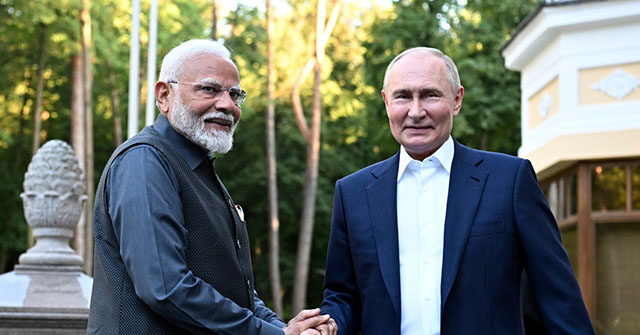Indian Prime Minister Narendra Modi revealed on Monday that he received a phone call from his Russian counterpart, Vladimir Putin, updating him on the results of the latter’s in-person meeting with President Donald Trump last week.
Trump and Putin held talks for about three hours in Anchorage, Alaska, on Friday, meant to both attempt to repair the frayed bilateral relationship in the aftermath of the presidency of Joe Biden and negotiate a path toward convincing Putin to stop the ongoing full-scale invasion of Ukraine. Following their engagement, Trump described their conversation as “extremely productive” and organized a meeting with Ukrainian President Volodymyr Zelensky in the White House, which took place on Monday. The next step, Trump told reporters, would be organizing a trilateral meeting in which Zelensky and Putin would sit down with Trump.
WATCH — President Trump and Vladimir Putin Meet in Alaska for Peace Summit:
Several European leaders, including French President Emmanuel Macron, Italian Prime Minister Giorgia Meloni, and British Prime Minister Keir Starmer also visited the White House on Monday as part of the greater effort to convince Putin to stop invading Ukraine and killing civilians.
India has no direct stake in the ongoing war in Ukraine, but maintains very close ties to Russia, both historically and through their joint membership in the anti-American security and trade bloc BRICS. India is one of Russia’s most lucrative buyers of crude oil – in part as the result of the full-scale invasion, which resulted in European sanctions on Russia’s fossil fuel market that made its crude much more affordable for India. Modi has nonetheless called for peace in Ukraine and made a solidarity visit to Kyiv in August 2024.
In his message confirming the phone call, Modi said that Putin shared “insights on his recent meeting with President Trump in Alaska.”
“India has consistently called for a peaceful resolution of the Ukraine conflict and supports all efforts in this regard. I look forward to our continued exchanges in the days to come,” Modi emphasized.
The Indian Foreign Ministry issued a statement similarly confirming that Ukraine was one of several topics discussed, in addition to “issues of bilateral cooperation.” The Kremlin confirmed the phone call but offered no further assessments.
Russia’s close relationship with India, which Modi emphasized on Monday, has become an obstacle for New Delhi in brokering a trade agreement with the United States. President Trump announced a dramatic overhaul of all of America’s trade relations in April, establishing baseline tariff rates for most American trade partners that they could later negotiate to lower. At press time, only a select small group of countries have successfully concluded trade negotiations with the Trump White House, including Britain, Indonesia, Vietnam, and Japan.
President Trump initially imposed a 25-percent tariff on India, citing the country’s traditionally protectionist policies that hurt American exporters and its relationship to Russia. In early August, he raised that rate to 50 percent, again citing India’s purchases of Russian oil as a reason.
“Remember, while India is our friend, we have, over the years, done relatively little business with them because their Tariffs are far too high, among the highest in the World, and they have the most strenuous and obnoxious non-monetary Trade Barriers of any Country,” Trump explained in a post on Truth Social, his social media platform, in July.
President Donald J. Trump holds hands with Prime Minister Narendra Modi of India as they take a surprise walk together Sunday, Sept. 22, 2019, around the NRG Stadium in Houston, Texas. (Official White House Photo by Shealah Craighead)
The post went on to note that India has “always bought a vast majority of their military equipment from Russia, and are Russia’s largest buyer of ENERGY, along with China, at a time when everyone wants Russia to STOP THE KILLING IN UKRAINE.”
That pressure from Washington has persisted. Writing for the Financial Times, White House trade adviser Peter Navarro condemned India for acting “as a global clearinghouse for Russian oil, converting embargoed crude into high-value exports.”
“As Russia continues to hammer Ukraine, helped by India’s financial support, American (and European) taxpayers are then forced to spend tens of billions more to help Ukraine’s defence,” he noted. “Meanwhile, India keeps slamming the door on American exports through high tariffs and trade barriers.”
WATCH — Trump Just Keeps Winning on Trade:
The extra 25-percent tariff will take effect on August 27, as per Trump’s executive order. India has made some effort to show solidarity with Ukraine since. Modi held a phone call with Zelensky on August 12, which Zelensky announced included “warm words of support” for Ukrainians besieged by the Russian invasion. Like Trump, Zelensky pressured Modi to consider redirecting some of India’s oil purchases away from Russia to stop funding the invasion.
“I noted that it is necessary to limit the export of Russian energy, particularly oil, to reduce its potential and ability to finance the continuation of this war,” Zelensky said of the phone call.
The Indian government has publicly refused to cede to pressure to buy oil from other sources. Some reports indicate, however, that New Delhi is nonetheless preparing to change the sources of its crude. Reports in late July and the first week of August indicated that some Indian state oil refiners had significantly increased purchases of American oil, even as India touted its “strategic partnership” with Russia.
Follow Frances Martel on Facebook and Twitter.
Read the full article here


